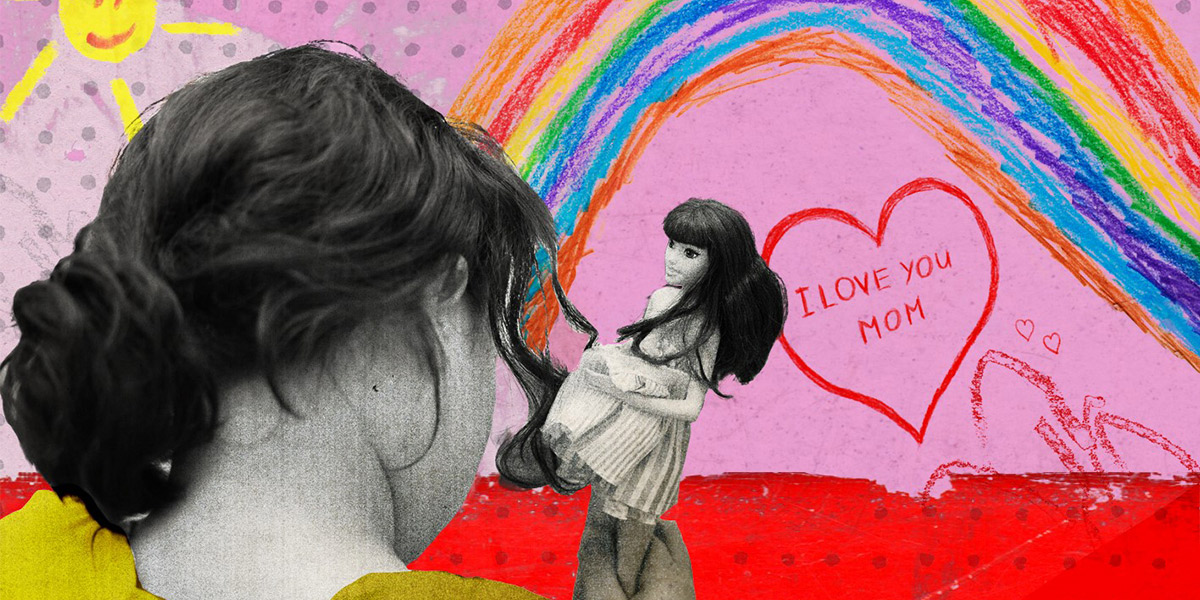Being Jewish
Between Barbie Land and the Real World

The sketchbook of drawings that I filled front-to-back with crooked rainbows and smiley-faced corner suns at the age of 5 and 6 has notes such as “I Love You” and “Keep on Smiling” scribbled on nearly every page. If strangers happened to flip through it, they would likely think of plastic dolls and multicolored building blocks and afternoons spent playing “house” on a school playground. I doubt that they would attribute those pages to a first-grade girl experiencing her earliest conceptions of death.
My mother gifted me that sketchbook around the time she was diagnosed with leukemia. I already had a Dora the Explorer-themed bedroom with pink walls and a stack of Disney Princess coloring books. I favored pink, yellow and purple markers to infuse that sketchbook with as much chaotic vibrance as I could. My father would bring it to my mother to look through while she was in the hospital.
Despite my family situation, I still went over to my next-door neighbor’s house every afternoon to play with Barbies. I loved creating funky outfits and imagining storylines for the dolls. I seemed to cling to symbols of lightheartedness, even when I was afraid. My drawings and storylines were all pink sunsets and rainbow clouds, not because I felt pressured or constrained by my gender, but because even as I was experiencing what I now recognize as anxiety, I genuinely enjoyed the positivity and fun of those activities.
Last summer, I was sharply reminded of that period of my life while watching Greta Gerwig’s Barbie. In a Vogue interview about the film, Gerwig, director and co-writer of Barbie, mentioned that part of her motivation for the project was a desire to represent the jarring reality that girls experience as they mature—that the world is much harsher than they imagined it to be. She noted that the deep-seated anxiety that often follows this realization can be sudden, persistent and difficult to accept. Girls are “funny and brash and confident, and then they just—stop,” Gerwig explained.
Much like the childhood described by Gerwig, the setting of the film’s Barbie Land relies on fun and positivity. It is a world where every woman has a place, a realm seemingly devoid of vitriolic conflict between women and any manifestations of internalized misogyny.
When Stereotypical Barbie, the film’s protagonist, begins to think about mortality, she must leave Barbie Land in order to seek answers about the limits of perfection and of her reality. As much as she wants to, she cannot simply abandon her questions and return to her previous existence. Through her quest, Barbie gains an uncomfortable yet powerful awareness about the way she is viewed and the negative beliefs that girls begin to have about her as they age.
As she confronts her legacy in the real world, she learns that it’s not as unequivocally positive as she thought. Many girls cling to pink and plastic dolls in their childhoods without thinking anything of it, but as they grow, they, too, emerge from their naïveté. Eventually, many question whether they ever really loved dolls or art or singing, or if they were just socialized into pursuing interests that are perceived as feminine. When they see a Barbie doll, they no longer think only of the hours spent making up stories and characters with their friends; they wonder if this doll has damaged their self-esteem.
As we get older, we understand that there are complications and uncomfortable truths about how we girls are perceived and how we think of ourselves.
My mother passed away when I was 6 years old. My father remarried, and I grew up with another excellent mother who has taught me and continues to teach me powerful lessons. One of these lessons is to try to channel the anxiety I have into motivation to succeed and help others. Because of that guidance, I still think of my childhood as a happy one, despite the tragedy of losing my mom.
Given my own experience—not dissimilar to Barbie’s in some ways— I believe that the newfound awareness of the discomfort girls feel as they mature should not negate the joy that once was. When it comes to Barbie, discovering some of the ills associated with the iconic doll shouldn’t erase the fun we had playing with it.
Annette Greenberg, a first-year student at Yeshiva University’s Stern College for Women from East Brunswick, N.J., is the winner of the 2023 Hadassah Magazine and jGirls+ Magazine teen essay contest. The latest contest asked: How have the adapted films Barbie and/or Are You There God? It’s Me, Margaret impacted you? What are your thoughts about both the messages they convey and the phenomena surrounding them?










 Facebook
Facebook Instagram
Instagram Twitter
Twitter
Adrienne Fishman says
Your article is beautifully written. I had tears in my eyes by the end.